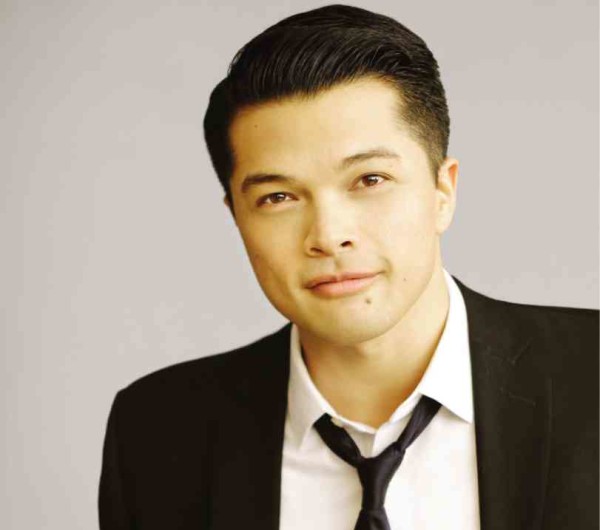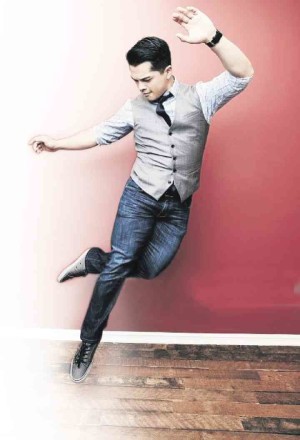A Fil-Am actor’s life: Vincent Rodriguez III
(This is the first in a series on the struggles and triumphs of Filipino-American actors in Hollywood.)
LOS ANGELES—Vincent Rodriguez III became the first Asian and Filipino actor to play a male romantic lead in mainstream US television, thanks to his Josh Chan role in The CW’s “Crazy Ex-Girlfriend.” Credit goes to the groundbreaking musical-comedy series’ creators, Aline Brosh McKenna and Rachel Bloom (she stars as Rebecca Bunch), who insisted on an Asian male lead.
Vincent’s journey before landing the pioneering role wasn’t easy. The San Francisco native, who earned a degree from the Pacific Conservatory of the Performing Arts, began his professional career with a dancing role in the ensemble of the national tour of “42nd Street.”
When that tour ended, Vincent moved to New York. While he landed roles, from the national tour of “Thoroughly Modern Millie” to “Here Lies Love” (David Byrne’s acclaimed musical on Imelda Marcos), Vincent endured many trials in pursuit of his acting passion.
He slept on the couch of other people’s homes for several months. He took on what he calls “survival jobs,” from apartment cleaner and waiter to massage therapist, even as a dancing Santa. He spent many hours at Starbucks in Times Square, hunched over his laptop in search of job leads.
Now that he’s back in the West Coast to be where “Crazy Ex-Girlfriend” is shot, Vincent said that it’s still tough to cinch other roles. To keep himself focused on his acting path amid all these challenges, Vincent said that he always thinks of an inspirational quote from Henry David Thoreau.
Excerpts from our chat:
How would you describe your journey as an actor so far?
I’d say it was a long, spiraling, thrilling roller-coaster ride with a handful of bumps along the way. I booked my first national tour of a Broadway show right out of college. It was the tap show, “42nd Street.” I had only been tap dancing for three years when I booked that show.
When I auditioned in New York shortly after that tour closed, I was couch-hopping for three months, carrying a 50-pound duffel bag on my back, going to every union musical I could audition for. A Starbucks in Times Square became my “office” as I would stay for two to six hours at a time, nursing an iced Venti caramel latte while using my 15-pound Dell laptop to keep track of my auditions.
This led to about three years of back-to-back work, which was very lucky for a first-timer like me. Then, things slowed down as my goals grew harder to achieve. I realized that I needed to strengthen the things that I was weakest at—acting and singing.
So I had to find ways to make money to afford the necessary training. I worked as a personal assistant, apartment cleaner, Ikea shopper/assembler, moving truck man, waiter, host, PR manager, bartender, massage therapist, caterer, etc.
Between acting jobs, I’d go visit my hometown and college town to see family and friends. But I would also teach acting, dance, singing and audition techniques in high schools and colleges.
I take great pride in all the survival jobs I worked, because I learned so much from them. They helped me become a better actor and person.
How do you prepare for an audition? Any good luck rituals?
I don’t believe in rituals that produce luck. I believe that a good preparation can raise my chances for a callback. With that, I know what I need to do, so I go in there and do my best.
What is the most frustrating part of trying to land roles in Hollywood?
Since being here in LA, I haven’t had too many opportunities to land any. I’m not that well-known in LA. As it has been addressed in the media, Asian-Americans are not typically at the forefront of being cast in leading roles, aside from my role (as Josh) in “Crazy Ex-Girlfriend.”
Although I see a positive shift occurring now for Asian-Americans, so I’m grateful to be a part of it. But from what I’ve experienced so far, I’d say the traffic in LA is frustrating. You spend a lot of time driving your car for an audition that could last just three minutes.
But I always love taking advantage of my auditions to become a strong actor and auditioner. Acting takes a lot of practice, but so does auditioning.
How do you handle rejection?
I’d say pretty well. Rejection doesn’t always mean I’m not good enough.
Have there been times when you almost gave up?
One of the scariest times when I almost gave up was about four winters ago in New York, when I was working as a waiter at a nice burger joint on the Upper East Side. I worked most of the time feeling unhappy and underutilized.
I couldn’t afford to take the classes I wanted to keep me hopeful. I needed to borrow money in order to afford those classes. Instead of asking friends, I asked one of my sisters. She told me about how she could no longer help support me when my money situation got tight. That was not the scary part.
What scared me was when she seriously suggested that I “do something else.” Not necessarily quit acting, but to get a steady job that would allow me to still be an actor. The idea of working a “steady” job and having to beg for time off to go away to work as an actor, shook me very hard. Especially coming from my sister.
For me, acting is not a hobby. It is a career that I have chosen and was not willing to let go of so easily after seven years of hard work. I remember feeling very defeated, but usually when I feel that way, I hear this voice in my head that tells me to prove “them” wrong.
So I worked hard, auditioned like I knew I had something to offer—and before I knew it, I booked a job. That boosted my confidence.
My holistic health coach, Robin Simpson, later gave me a quote by Henry David Thoreau that I would forever use to remind myself of my path: “Go confidently in the direction of your dreams. Live the life you’ve imagined.” Thankfully, that mentality got me this far.
Do you, as an actor of color, feel that opportunities for minority actors are improving or getting worse?
Great improvement is occurring for actors of color/minority. It’s taken more work to get here than it should, but at least changes are definitely occurring in favor of representing people of color.
What’s your stand on whitewashing—or the casting practice in which white actors are cast in nonwhite character roles—in Hollywood?
It’s flat out wrong. I understand why it has happened in the past, but we are much more open-minded now, so it’s not as excusable as it once was. We’re making great progress but we have to continue raising our voices to prevent whitewashing.
We need to encourage the presence of more Asian writers and executive producers, so they can fight for normalizing the casting of Asians in traditional American roles.
To people who are planning to pursue acting, what should they prepare for?
They need to prepare to listen, be kind, seek the truth, find their voice, be themselves, be a lifelong student and work harder than they ever have in their life.
E-mail rvnepales_5585@yahoo.com. Follow him at https://twitter.com/nepalesruben

